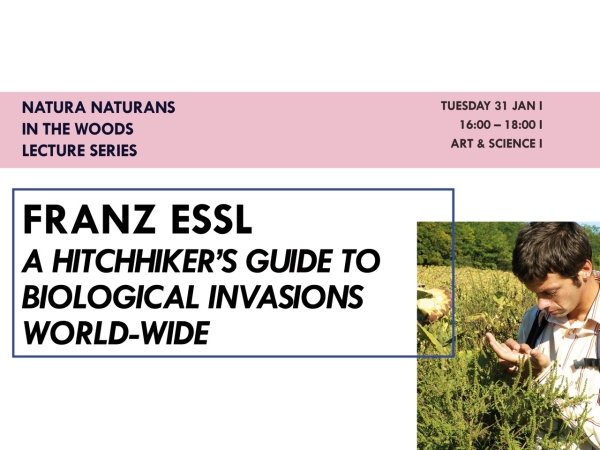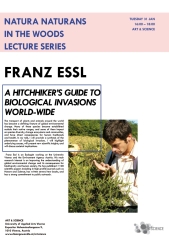The transport of plants and animals around the world has become a defining
feature of global environmental change. Many of these species become established outside their native ranges, and some of
them impact on species diversity, change ecosystems and communities, and have direct conseqiences for human livelihoods and
health.
In my talk, I will provide a synthesis of the phenomenon of biological invasions. I
will highlight underlying causes, will present new scientific insights, and will discuss societal implications.
Franz
Essl is an Ecologist working at the University Vienna and the Environment Agency Austria. His main research interest is on
improving the understanding of global environmental change and its consequences for biodiversity and human society. He has
published >100 scientific papers including in high-profile journals such as Nature and Science, has written several text
books, and has a strong committment to public outreach.NATURA NATURANS – IN THE WOODS // Lecture
seriesWhich ingredients are necessary to transform Nature into ‘Natura naturans’–a place wherein bodies strive
to enhance their power of activity by forging alliances with other bodies in their vicinity? (Bennett, J. on Spinoza, 2004)
Presumably, the notion of matter has to change: instead of postulating inanimate matter which does nothing more than composing
the world out of long concatenations of cause and effect where nothing is supposed to happen (Latour, B. 2010), a “new materialism”
installs freedom, movement, creativity in the very heart of things. What tools might be appropriate to realise this conceptual
change from passive to active matter, to transport various kinds of ingredients into the motley arena of things? Transport
and transportation need mediators that import and export and thus traverse. Metaphor, in facts, means “transport“. And this
is a (research)question:
Can metaphors act as mediators for transportation? Like Gaia, mediators can be human and non-human
things that invent but also can betray, that nourish, but also can be mistaken. Transportation (metaphors) can be the craziest
and the most certain – metaphors as messenger create contradiction and foreignness/otherness that may be the route to invention.
(Serres, M., 1995)
This module explores the transdisciplinary conditions for transportations and their consequences for
invention. We meet in the woods, this proud and humble emblem of nature. And there is a method: “Research in the wild” aims
at exploring actors and active entities that populate this emblematic site. Point of departure of Research in the Wild: the
wood as a polluted, impure, composite reality, and, secluded research in laboratories that risks paralysis if it refuses to
cooperate with research in the wild. (Callon, M., Rabeharisoa, V., 2003) And there is a caveat: when “first” Nature (and the
hegemony of scientific knowledge that claims to define that “first” nature for its own part) starts to lose its monopoly (see
e.g. “multinaturalism”), it seems to be fair to distrust a “second” Nature: Economy as the universal dialect of a globalised
world, and, to avoid believing that the Economy would supply “the unsurpassable horizon” of investigation and nevertheless
respect what informants say about the troubles with subsistence.
There is an aim: to explore and chart a site-specific
transdisciplinary trajectory of metaphors: a model of the fictional existence of a forest area. A time-based chart that encompasses
the multiplication of goods and bads, the production and following organisational scripts, the exploration of the links between
ends and means, the
risks of reproduction. A chart that “animates”.
See also:
www.dieangewandte.at/artscience




